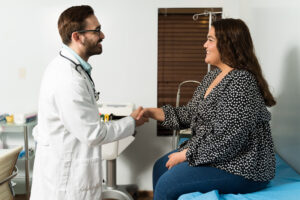
How Texas Is Becoming a Hub for Cutting-Edge Obesity Research
How Texas Is Becoming a Hub for Cutting-Edge Obesity Research
Texas has long been recognized for its size and innovation, and it is now emerging as a leader in obesity research and weight-loss studies. Research centers across the state, including those in Dallas, Austin, and Houston, are combining medical expertise with clinical trials and the development of new medications to enhance our understanding and treatment of obesity. This blog explores these advancements and their impact on efforts to tackle obesity in Texas and beyond.
A Growing Need for Better Obesity Solutions
 More than two out of five American adults are obese, a condition that contributes to severe illnesses such as heart disease and diabetes. In Texas, where these health issues are common, there’s a growing need for effective treatments.
More than two out of five American adults are obese, a condition that contributes to severe illnesses such as heart disease and diabetes. In Texas, where these health issues are common, there’s a growing need for effective treatments.
Clinical research is addressing this issue. Today’s studies look beyond diet and exercise to test new medications that help with weight loss by targeting metabolism and hormones, promoting safer and more effective health improvements.
One exciting initiative is the ACRC Weight-Loss Study, part of a statewide effort to provide Texans with access to the latest advances in weight management.
Texas Cities Leading the Way in Obesity Research
 ACRC Clinical Trials has research centers in Dallas, Plano, Frisco, Carrollton, Grapevine, Austin, and Houston, making it easy for individuals in North and Central Texas to participate in their studies. At every site, skilled doctors, research coordinators, and medical staff are dedicated to enhancing participants’ health through innovative scientific discoveries.
ACRC Clinical Trials has research centers in Dallas, Plano, Frisco, Carrollton, Grapevine, Austin, and Houston, making it easy for individuals in North and Central Texas to participate in their studies. At every site, skilled doctors, research coordinators, and medical staff are dedicated to enhancing participants’ health through innovative scientific discoveries.
These studies are different from standard weight loss programs and provide participants with:
- Investigational medication meant to control appetite and metabolism
- No-cost health check-ups and lab work
- Compensation for time and travel costs while in the study
Due to these benefits, including ease of access, innovation, and professional care, Texas is emerging as a major hub for obesity research, and ACRC Trials is recognized as a highly reliable leader in this field.
The Science Behind Hormone-Based Weight Loss
 Two important hormones, GLP-1 and GIP, are central to today’s studies on obesity. These hormones, which our bodies naturally produce, play a crucial role in regulating our hunger levels, blood sugar levels, and energy metabolism.
Two important hormones, GLP-1 and GIP, are central to today’s studies on obesity. These hormones, which our bodies naturally produce, play a crucial role in regulating our hunger levels, blood sugar levels, and energy metabolism.
A study reviewed by experts and released by the National Institutes of Health indicates that therapies based on GLP-1 have demonstrated significant effectiveness in reducing body weight and enhancing metabolic health. The current trial at ACRC Trials, which combines the actions of GLP-1 and GIP, may yield even greater results than targeting either hormone individually.
This new generation of medications marks a shift from temporary weight-loss strategies to more sustainable improvements in metabolic health. Participants may not only shed pounds but also feel more energetic, sleep better, and have greater control over their food cravings.
Why Texas Is the Perfect Place for Medical Innovation
Texas is a great place for medical research for several reasons:
- Population Divercity: Cities such as Dallas–Fort Worth, Austin, and Houston have many kinds of people, which allows scientists to look at health problems in different groups.
- Strong Medical Facilities: The state has excellent hospitals and universities that work together on research.
- Community Involvement: Texans are eager to help out, contributing to progress that benefits everyone.
The ACRC Trials’ network of clinics combines these strengths to make groundbreaking treatments available to everyday people right here in Texas.
Real Benefits for Real People
 Joining an obesity study is about more than losing weight—it’s about being part of something important. Volunteers get study-related medical care and support from professionals in a caring setting. By participating, they help develop treatments that could assist millions of people worldwide.
Joining an obesity study is about more than losing weight—it’s about being part of something important. Volunteers get study-related medical care and support from professionals in a caring setting. By participating, they help develop treatments that could assist millions of people worldwide.
Many volunteers find the experience empowering. They play an active role in helping researchers figure out how to make weight loss safer and more effective.
How to Get Involved
 If you live near Dallas, Plano, Frisco, Carrollton, Grapevine, Austin, or Houston and have difficulty losing weight, you might qualify for ACRC Trials’ study. Participants receive medical supervision, health check-ups, and can earn up to $5,300 for their time and travel.
If you live near Dallas, Plano, Frisco, Carrollton, Grapevine, Austin, or Houston and have difficulty losing weight, you might qualify for ACRC Trials’ study. Participants receive medical supervision, health check-ups, and can earn up to $5,300 for their time and travel.
To find out more or see if you qualify, visit the ACRC Trials’ Weight-Loss Study page and fill out a short pre-screening form. This could help improve your health and support research in the treatment of obesity.
ACRC Trials: Advancing Medical Research Through Teamwork and Innovation
Texas is a leader in obesity research, making important advances and helping communities. Organizations like ACRC Trials are transforming lives and paving the way for the future of medicine.

